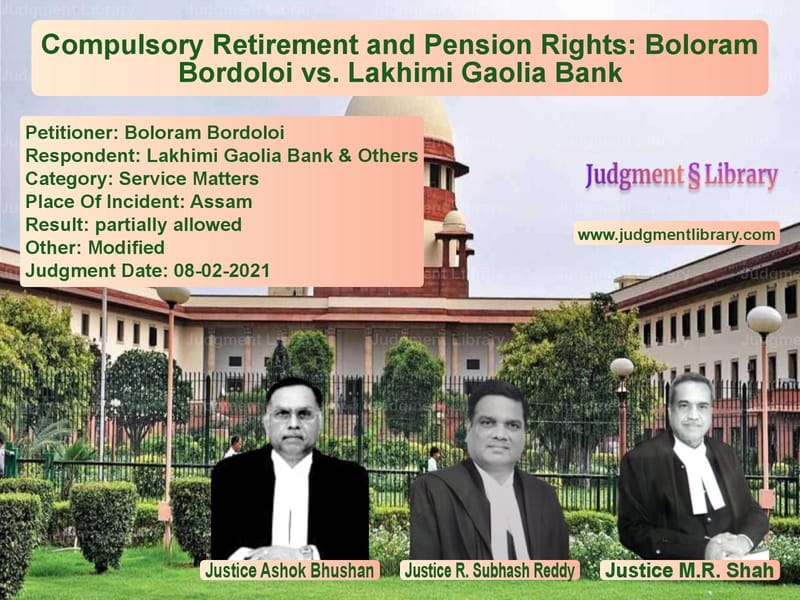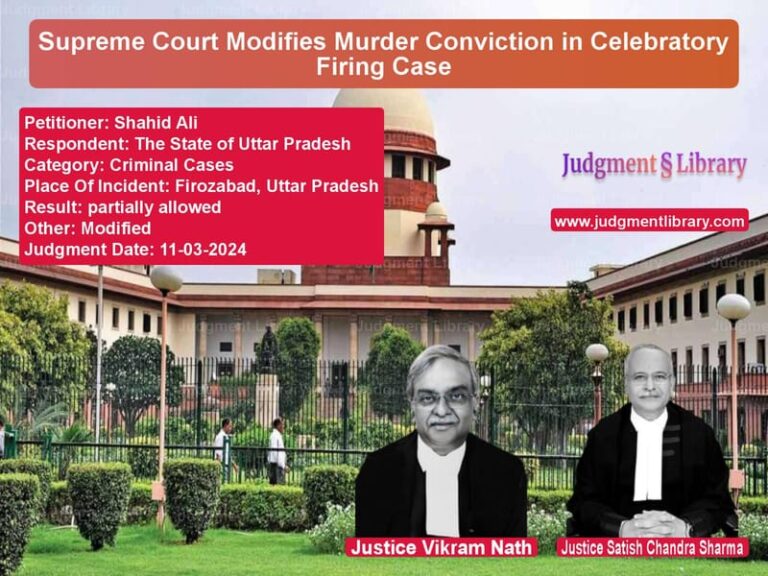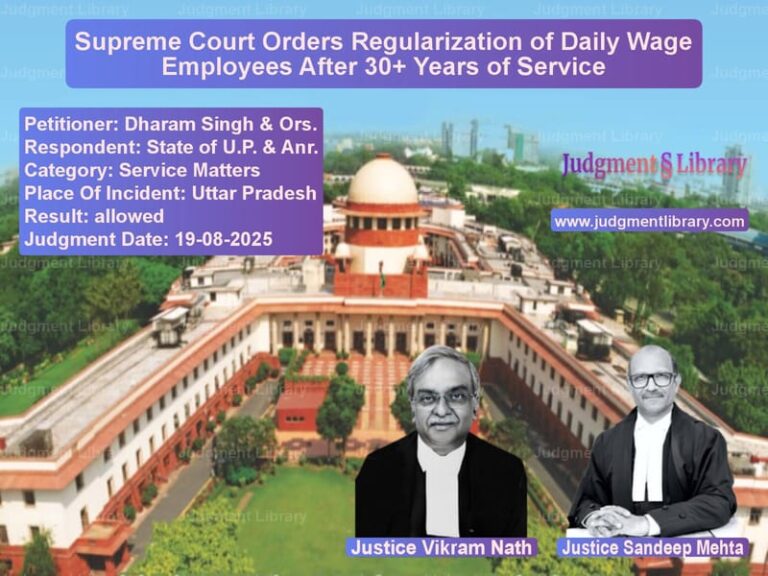Compulsory Retirement and Pension Rights: Boloram Bordoloi vs. Lakhimi Gaolia Bank
The case of Boloram Bordoloi vs. Lakhimi Gaolia Bank & Others is a significant judgment regarding compulsory retirement in disciplinary proceedings and the right of an employee to receive pension and service benefits post-retirement. The Supreme Court examined whether the order of compulsory retirement imposed on the appellant was lawful and whether the bank was justified in withholding his pensionary benefits.
Background of the Case
Boloram Bordoloi was a Manager at Lakhimi Gaolia Bank. On June 18, 2004, disciplinary proceedings were initiated against him based on allegations of financial misconduct, improper loan sanctions, and procedural violations. The charges against him included:
- Sanctioning and disbursing loans without following due procedure.
- Misappropriation of bank funds.
- Issuing multiple loans to members of the same family.
- Providing loans to entities that did not exist as operational businesses.
Following an inquiry, all five charges against him were found to be proved. Consequently, the bank imposed the penalty of compulsory retirement on August 29, 2005. The appellant’s appeal before the Board of Directors of the Bank was dismissed.
Boloram Bordoloi then challenged the decision in the Gauhati High Court through a writ petition. The Single Judge upheld his compulsory retirement but ruled that withholding his service and pensionary benefits was illegal. The bank appealed, and the Division Bench of the High Court dismissed the appeal, affirming that the appellant was entitled to his retiral benefits. Dissatisfied, the bank further appealed to the Supreme Court.
Key Legal Issues
- Whether the compulsory retirement of the appellant was justified based on the findings of the disciplinary inquiry.
- Whether withholding pension and retiral benefits was legally valid.
- Whether the disciplinary proceedings followed due process.
- Whether the punishment of compulsory retirement was disproportionate to the charges proved.
Arguments by Boloram Bordoloi
- The appellant argued that he was denied a fair disciplinary process as he was not provided with the inquiry report before the disciplinary authority proposed his retirement.
- He contended that the charges were exaggerated and that any lapses on his part were due to work pressure rather than misconduct.
- He stated that the punishment of compulsory retirement was disproportionate to the nature of the allegations.
- He argued that even if his retirement was justified, withholding his pension and other service benefits was illegal under service law provisions.
Arguments by Lakhimi Gaolia Bank
- The bank maintained that the appellant had sanctioned loans in violation of established guidelines, leading to financial losses.
- It contended that the disciplinary process was fair and that the inquiry report had been made available to the appellant along with the show cause notice.
- The bank argued that compulsory retirement was the most lenient punishment in the given circumstances, considering that termination or dismissal were also possible alternatives.
- It justified the withholding of pension and retiral benefits, citing the gravity of the misconduct.
Supreme Court’s Analysis
The Supreme Court evaluated the disciplinary proceedings and made the following key observations:
- “A bank officer/employee deals with public money, and the nature of his work demands vigilance with the inbuilt requirement to act carefully.”
- “If an officer/employee of a bank is allowed to act beyond his authority, the discipline of the bank will disappear.”
- “The procedural guidelines for granting loans must be followed meticulously, and any deviation results in an erosion of public trust.”
The Court found that the appellant had admitted to certain lapses in his response to the show cause notice. While he attributed them to work pressure, he also acknowledged the possibility of financial losses and offered to bear them personally. The Court rejected his claim that the punishment was disproportionate, stating that financial misconduct, even if unintentional, has serious consequences in the banking sector.
However, the Court agreed with the High Court that withholding pension and service benefits was unjustified. It reiterated that pension is a right and not a bounty, and unless there is a specific provision authorizing its forfeiture due to misconduct, it cannot be denied.
Final Judgment
The Supreme Court upheld the compulsory retirement of the appellant but ruled that the withholding of pension and other retiral benefits was illegal. It directed the bank to:
- Release all pensionary and service benefits due to the appellant within three months.
- Pay any arrears with interest as applicable under the relevant service rules.
The Court concluded that while financial discipline in banking institutions must be strictly enforced, retired employees cannot be deprived of pensionary benefits without explicit legal authority.
Implications of the Judgment
This ruling has significant implications for employment law, particularly in the banking sector:
- It reinforces that compulsory retirement is a valid disciplinary action but must follow due process.
- It affirms that pension rights cannot be arbitrarily denied, even in cases of misconduct.
- It establishes that banks must adhere to procedural fairness in disciplinary proceedings.
- It ensures that financial institutions maintain transparency and accountability in employment disputes.
Conclusion
The Supreme Court’s decision in Boloram Bordoloi vs. Lakhimi Gaolia Bank strikes a balance between maintaining discipline in the banking sector and protecting the rights of retired employees. The ruling ensures that while financial misconduct is not taken lightly, individuals cannot be deprived of their legally entitled benefits without a clear legal basis. This judgment serves as an important precedent in employment law and pension rights.
Petitioner Name: Boloram Bordoloi.Respondent Name: Lakhimi Gaolia Bank & Others.Judgment By: Justice Ashok Bhushan, Justice R. Subhash Reddy, Justice M.R. Shah.Place Of Incident: Assam.Judgment Date: 08-02-2021.
Don’t miss out on the full details! Download the complete judgment in PDF format below and gain valuable insights instantly!
Download Judgment: boloram-bordoloi-vs-lakhimi-gaolia-bank-supreme-court-of-india-judgment-dated-08-02-2021.pdf
Directly Download Judgment: Directly download this Judgment
See all petitions in Pension and Gratuity
See all petitions in Public Sector Employees
See all petitions in Employment Disputes
See all petitions in Disciplinary Proceedings
See all petitions in Judgment by Ashok Bhushan
See all petitions in Judgment by R. Subhash Reddy
See all petitions in Judgment by Mukeshkumar Rasikbhai Shah
See all petitions in partially allowed
See all petitions in Modified
See all petitions in supreme court of India judgments February 2021
See all petitions in 2021 judgments
See all posts in Service Matters Category
See all allowed petitions in Service Matters Category
See all Dismissed petitions in Service Matters Category
See all partially allowed petitions in Service Matters Category







